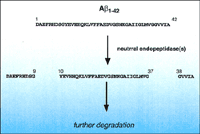  |
 |
 |
Identification
of the Process of Amyloid  -Peptide
Degrading Catabolism in the Brain -Peptide
Degrading Catabolism in the Brain
Laboratory
for Proteolytic Neuroscience |
 |
 |
Dr.
Takaomi C. Saido, Head of the Laboratory for Proteolytic Neuroscience and colleagues
have successfully clarified the degrading mechanism of amyloid  -peptide
in the brain through the application of a new experimental paradigm that uses
radioisotopes for the analysis of amyloid -peptide
in the brain through the application of a new experimental paradigm that uses
radioisotopes for the analysis of amyloid  -peptide,
a key protein for the research of brain aging. Primarily responsible for the aging
of the brain that leads to Alzheimer's disease is believed to be the deposition
of amyloid -peptide,
a key protein for the research of brain aging. Primarily responsible for the aging
of the brain that leads to Alzheimer's disease is believed to be the deposition
of amyloid  -peptide.
The amyloid §-peptide
is a sort of Òdaily garbage in vivo,Ó which is constantly anabolized and catabolized
in a normal brain. While much of the process of its anabolism has been extensively
studied in the last decade, its catabolic process remains largely unclarified.
This study found that a protein-degrading enzyme called neutral endopeptidase
plays a key role in the catabolic process and that a suppression of its action
leads to the deposition of amyloid -peptide.
The amyloid §-peptide
is a sort of Òdaily garbage in vivo,Ó which is constantly anabolized and catabolized
in a normal brain. While much of the process of its anabolism has been extensively
studied in the last decade, its catabolic process remains largely unclarified.
This study found that a protein-degrading enzyme called neutral endopeptidase
plays a key role in the catabolic process and that a suppression of its action
leads to the deposition of amyloid  -peptide.
One achievement of this study is the discovery of a clue to the clarification
of the aging mechanism of the brain. This research has also paved the way for
a possible prevention and remedy of dementia by regulating brain aging through
the manipulation of the catabolic process. -peptide.
One achievement of this study is the discovery of a clue to the clarification
of the aging mechanism of the brain. This research has also paved the way for
a possible prevention and remedy of dementia by regulating brain aging through
the manipulation of the catabolic process. |
 |
 |
Amyloid
 -Peptide
Degrading Catabolic Pathway -Peptide
Degrading Catabolic Pathway
magnified scene by clicking image
|
Iwata, N., Tsubuki, S., Takaki, Y., Watanabe, K., Sekiguchi, M., Hosoki, E., Kawashima-Morishima,
M., Jun Lee, H., Hama, E., Sekine-Aizawa, Y., Saido, T. C. Identification of the
major AƒÀ1-42-degrading catabolic pathway in brain parenchyma: Suppression leads
to biochemical and pathological deposition Nature Medicine, Vol. 6, No. 2, pp143-150,
February (2000)
|
|
 |
 |
|
|






